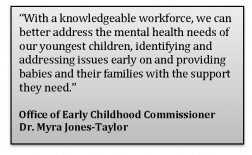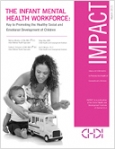March 25, 2015
Promoting the Healthy Social and Emotional Development of Children Through an Informed Workforce
One of the most important influences on a young child’s healthy growth and development is his or her relationship with a caring and nurturing adult from birth. Unfortunately, not all children benefit from such relationships in their very first years of life, placing them at risk for mental health concerns. Between 9.5 and 14 percent of children under age six experience social-emotional problems that affect their functioning, development and school readiness.
Professionals from many disciplines who provide care for young children have an important role to play in promoting the social-emotional development (mental health) of young children.They comprise what is considered the “infant mental health workforce” and can include: early care and education providers, child health care providers, home visitors, occupational and speech therapists, and mental health professionals. To effectively address the mental health of young children, these professionals can benefit from training in how to best promote social-emotional development, recognize when there are concerns as early as possible and connect families to supports and services. Unfortunately in Connecticut and nationally, most pre-professional education and training programs lack courses related to infant and toddler mental health.
Connecticut Approaches
In recent years, Connecticut has taken steps to ensure that professionals working with  infants, toddlers and their families are knowledgeable and skilled in promoting social-emotional development and addressing mental health concerns.
infants, toddlers and their families are knowledgeable and skilled in promoting social-emotional development and addressing mental health concerns.
The Connecticut Association for Infant Mental Health (CT-AIMH), with support from the Children’s Fund, state agencies and others, adapted a competency-based system of training and credentialing from the Michigan AIMH leading to an endorsement in culturally sensitive, relationship-focused service specific to infant mental health. The endorsement guidelines are based on the principle that all development occurs in the context of relationships. To date, 53 Connecticut professionals have earned or are in the process of earning the CT-AIMH Endorsement®. In addition, CT-AIMH has provided training in infant mental health to approximately 500 professionals in Connecticut through partnerships with CHDI, Early Head Start, the Office of Early Childhood, the Department of Children and Families (DCF) and Birth to Three.
Similar to legislation passed in 2013 (P.A. 13-178, Section 2), the State Legislature is once again considering a bill directing the Office of Early Childhood to provide professional development training to pediatricians and child care providers to help prevent and identify mental, emotional and behavioral health issues in children by utilizing the Infant and Early Childhood Mental Health Competencies or a similar model (S.B. 841, Section 2). Training professionals and parents is also a key part of the Connecticut Children’s Behavioral Health Plan submitted by DCF to the Legislature last October.
Earlier this month, CHDI published an IMPACT report entitled: The Infant Mental Health Workforce: Key to Promoting the Healthy Social and Emotional Development of Children. The report, funded by the Office of Early Childhood as part of its effort to promote an early childhood workforce skilled in infant mental health, provides more information about infant mental health, the competencies and endorsement process and efforts underway to build a trained workforce in Connecticut.
Recommendations in the report include:
 children and their families
children and their familiesVisit www.chdi.org to download the IMPACT or to read more about CHDI’s work related to infant mental health. To request printed copies, call Cindy Langer: 860-679-1538. Learn more about the CT-AIMH Endorsement at www.CT-AIMH.org. Information for parents and caregivers about infant mental health is available at www.kidsmentalhealthinfo.com.